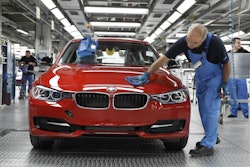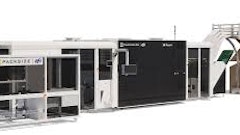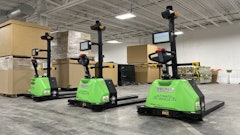April 14--Editor's note: A team of Journal staffers spent a week in southern New Mexico in late March to look at the significant economic developments. This is part three in a four-part series.
SANTA TERESA -- Mexico's maquila industry has become a raging bull that's busting up the competition in China and other Asian nations for the first time in decades.
Rapidly rising costs to produce and ship goods from Asia, especially heavy industrial items such as cars and home appliances, are encouraging the world's major producers to ditch overseas manufacturing and instead set up operations in Mexico, where proximity to U.S. markets helps to lower costs and increase operating efficiencies.
That's good news for New Mexico, and for all U.S. border states, because the rapid growth of Mexico's maquilas, or assembly factories, is creating huge business opportunities up and down the 2,000-mile U.S.-Mexico border. And that, in turn, is creating new industrial hot spots in places such as southern New Mexico, where companies are flocking to set up new facilities to supply goods and services to the maquila industry.
"We're seeing a steady 're-shoring' of industry investment from China to Mexico that's creating huge opportunities here for everything from manufacturing and transportation to warehousing services and technology-related enterprises," said New Mexico Economic Development Secretary Jon Barela. "We believe a wide array of businesses can flourish along the border as the maquila industry continues to grow."
Huge 're-shoring' underway
"Re-shoring" is a fairly new phenomenon that's reversing decades of investment flight to places such as China, where producers began establishing factories in the 1970s to take advantage of cheap labor and flexible rules and regulations.
Those competitive advantages are fading as Asian nations become more integrated into global trade networks, increasing pressure for them to comply with international standards on labor, the environment and quality control, said Alan Russell, president and CEO of Tecma Sheltered Services, an El Paso-based company that operates 15 maquila plants in Mexico.
"China increased its minimum wage by 20 percent this year, and producers there and in other Asian countries are facing tighter compliance regulations and scrutiny from auditors," Russell said. "It's also harder to get away with the kinds of human-rights violations that were common in the past, such as using underage workers. Producers there are now being held to the same standards as other nations, and that's increasing their costs."
In addition, energy and transportation expenses have skyrocketed in the past decade, making shipping from overseas factories much costlier, said Roberto Coronado, assistant vice president in charge of the El Paso branch of the Federal Reserve Bank of Dallas.
Transport cost advantage
"Transportation costs have been on the rise since 2003, and they're still very elevated," Coronado said. "That's made it far more expensive to move goods from Asia to the U.S."
Other pressures include the strengthening of Chinese and some other Asian currencies against the U.S dollar, which makes exports from those countries more expensive, and the length of time it takes to transport goods from those places to North America, Coronado said.
As a result, global producers of everything from cars and auto parts to aviation technology, medical devices and home appliances are establishing maquilas in Mexico to be closer to U.S. markets. It's an emerging re-shoring strategy that not only reduces transportation expenses, but allows for "just-in-time" manufacturing and delivery of products to increase operating efficiencies, Coronado said.
All of that is providing huge competitive advantages to Mexico.
"It's a revolution," Russell said. "For the first time in 50 years, the lines have crossed from a cost standpoint to favor producing in Mexico rather than producing in China."
Foreign investment is flooding into Mexico's maquila industry from all over, including the U.S., Europe and Asian countries to better position themselves for sales in North America.
Foreign direct investment in maquilas reached nearly $13 billion last year, up from just $7 billion in 2012 and its highest level since before the recession in 2007, according to Mexico's national statistics institute. The value of maquila exports has jumped nearly 50 percent from pre-recession levels.
Sophisticated, diverse
The maquilas themselves have grown much more sophisticated and diversified in recent years, with Mexico now ranking as the world's No. 1 exporter of flat screen TVs and refrigerators with freezers, and the fifth-largest auto-parts producer globally.
"Today, Mexico is the second-largest exporter of autos to the U.S.," Coronado said. "It displaced Japan two months ago, and it will soon displace Canada."
That's a sea change from the 1960s, when the maquilas first emerged in Mexico to provide final assembly of simple products destined for U.S. markets using inexpensive Mexican labor. In those early years, the maquilas were often called "draw-back industries." They were generally located just across the border so that U.S. companies could send things such as shirts and sweaters there for low-wage workers to sew on buttons before shipping the finished product back to markets in the U.S.
The growth and diversification of Mexico's maquila industry is a boon to the U.S. border economy, and to U.S. manufacturing in general, given its deep-rooted connections to U.S. production and investment. Only about 10 percent of the inputs used in the maquilas -- including raw materials, parts and services -- are actually produced in Mexico. Most come from U.S. businesses.
U.S. maquila support
"On the U.S. side, we provide every type of service related to maquila manufacturing and trade," Coronado said. "That includes transportation, warehousing, logistics, real estate, insurance and staffing."
It also includes raw materials and semi-processed goods.
The lion's share of trade with Mexico is based in Texas, especially in Laredo, which accounted for 40 percent of the $500 billion in exports and inputs that crossed the border by land last year. El Paso accounted for another 18 percent, making Texas the number 1 gateway for U.S. trade south of the border.
"More than 50,000 jobs in El Paso are attributed directly to the maquila industry in Juarez," Russell said. "More than 70 buildings in El Paso are occupied, or exist, because of the maquilas."
Now, a significant chunk of trade and maquila-related border business is building as well in southern New Mexico, where an industrial boom is underway.
The number of maquila-connected businesses located in Santa Teresa grew by 50 percent in the last two years. And, land trade passing through the Santa Teresa-San Jeronimo border crossing has increased dramatically.
"Santa Teresa accounted for about 5 percent of all U.S.-Mexico land trade last year," Coronado said. "That's up from less than one-half a percent seven or eight years ago."
Good N.M. prospects
As Mexico's maquilas expand, prospects are good for capturing a lot more business in southern New Mexico. That's because the New Mexico and Chihuahua state governments are working together to build needed infrastructure to turn the Santa Teresa-San Jeronimo crossing into a major binational land port.
That could attract a lot more supply businesses to Santa Teresa to provide goods and services throughout Chihuahua, where 420 maquila plants currently operate.
It could also bring more maquilas directly to San Jeronimo, providing greater opportunities for Santa Teresa-based businesses. Taiwanese electronics giant Foxconn, for example, which already operates two factories in San Jeronimo, wants to eventually open 14 more plants there.
In fact, private investment in Santa Teresa and San Jeronimo is likely to grow faster than public infrastructure, given the rapid expansion of maquila activity in Mexico.
"Demand for industrial space on both sides of the border is up," said Octavio Lugo, chief operating officer for Corporacion Inmobiliaria, which owns 47,000 acres of land in San Jeronimo. "We can't sit around and wait for the federal government to finish building border crossings, because real demand is growing by businesses to operate in the area."
Copyright 2014 - Albuquerque Journal, N.M.



















